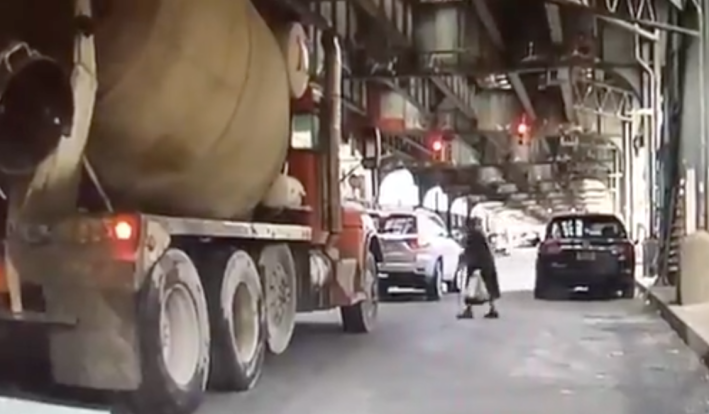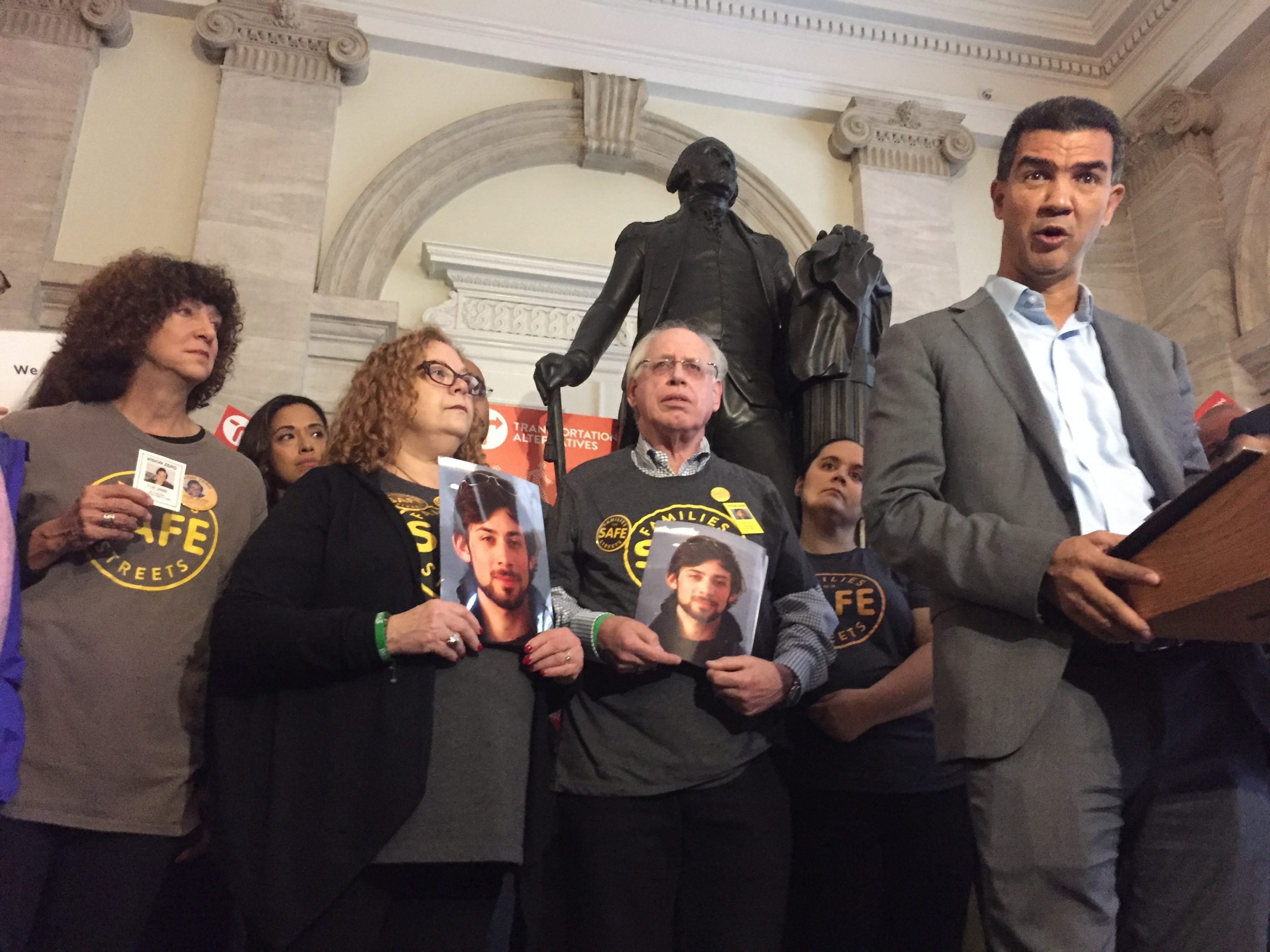City & State NY is hosting a full day New York in Transit summit on Jan. 30 at the Museum of Jewish Heritage. This summit will bring together experts to assess the current state of New York’s transportation systems, break down recent legislative actions, and look towards the future of all things coming and going in New York. Join Keynote Speaker Polly Trottenberg, commissioner of the NYC Department of Transportation, along with agency leaders, elected officials, and advocates. Use the code STREETSBLOG for a 25-percent discount when you RSVP here!
Massive trucks must be equipped with life-saving sensors so that the drivers inside them can’t claim they didn’t see someone before fatally running over them, Manhattan Council Member Ydanis Rodriguez demanded on Tuesday after emerging from a closed-door meeting with trucking industry honchos.
The round-table was convened to discuss how to reform the trucking industry, whose drivers have contributed to a large portion of city road deaths last year — and it came a week after a child and an elderly woman were killed by truck drivers in separate incidents hours apart. The senior, Judith Wieder, was run over by the truck driver even though she was standing directly in front of the truck.
Rodriguez, who chairs the council's Transportation Committee, came out of the meeting and focused on a proposal to install sensors to alert truck drivers that a person is in front, to the side, or to the back of the truck — "so that drivers get the images of pedestrians and cyclists around them, especially when they turn,” he said.
“All those lives we lost have been involving trucks,” he added.
Today at 12pm I will be joining multiple City Agencies and trucking association stakeholders to discuss truck road safety in NYC!
— Ydanis Rodriguez (@ydanis) January 14, 2020
✴️At 2PM, I will hold a debrief on some of the topics that were discussed during the meeting and how we will continue improving truck road safety... pic.twitter.com/4CvGsunvD3
Leaders from the trucking industry, including those from Hub Truck Rental, New York Oil Heating, New York Truck Stop, United Parcel Service, Fresh Direct, Waste Connection, and Action Environmental were invited to the discussion, along with representatives from the Department of Transportation, NYPD, Department of Sanitation, and the Department of Citywide Administrative Services.
But Rodriguez’s office would not provide a list of who actually showed up to the meeting from the private sector.
Rodriguez said the sensors are already a mainstream part of the trucking industry in Europe — where the traffic fatality rate is about half that of the United States's — and that the same manufacturers who sell to businesses that operate in the five boroughs ship the same trucks here, just without the sensors.
But that must end, said Rodriguez, who is calling on national trucking companies to equip all of their trucks with alarms that alert drivers to people walking or biking near them.
“Those truck manufacturers that sell those vehicles in Europe, they install the sensors. But when they come to the United States, those sensors are not installed on our trucks," he said, adding such equipment should be mandatory if a company wants to do business with the city.
"We will continue working with the private sector and public sector in different initiatives, and one is to add sensors to be installed on all trucks, public and private," the pol said. "I'm asking all of the city fleet to have sensors, and anyone who does business with the city should have a sensor.”
Such an alarm could very well have saved the life of 68-year-old Wieder, who was struck by the driver of a cement truck as she crossed New Utrecht Avenue on Jan. 7.

Disturbing video posted to Twitter shows Wieder, walking with a cane, start to cross the avenue while the light is still red. Wieder makes it about half-way across, and is directly in front of the massive truck, as the light turns green and the driver hits the gas to head north — clearly oblivious to the fact that the woman is directly in front of him.
The truck hood obscures the woman entirely — one of the reasons truck drivers were responsible for a plurality of road deaths last year. The truck appears to be equipped with crossover mirrors, which do allow drivers to see what is in front of them, but it is not likely that the driver consulted them before hitting the gas.
ווידיאו פין די עקסידענט אין בארא פארק ווי א פרוי איז ליידער אימגעקימען רח"ל pic.twitter.com/jjxFLFAsB7
— Hasidic (@hasidic_1) January 7, 2020
Wieder’s death occurred just hours after a 10-year-old boy was also killed by the driver of a city sanitation truck in Queens.
Both Wieder and the young boy, Shree Panthee, are among the many victims killed by truck drivers whose lives could have been saved with sensors — a list that includes 27-year-old Neftaly Ramirez, who was killed while biking by a private sanitation truck driver who later told police he never saw the biker even though he turned into him; 13-year-old Kevin Flores, who was killed by the driver of a massive oil truck who also claimed he didn't see the teen biking next to him as he turned; and 25-year-old Aurilla Lawrence, who was killed by the driver of an oil truck who similarly claimed he never saw his victim.
Rodriguez also wants the city to expedite the requirement that all 10,000-pound-plus private sanitation trucks be installed with side guards, which keep pedestrians and cyclists from being swept beneath the massive vehicles’ rear wheels. The industry has until 2024 to install the side guards, but as of October, Streetsblog reported, only 15.3 percent of trucks had gotten them. Rodriguez and his colleague, Brooklyn Council Member Antonio Reynoso, want to speed that timeline.
For its part, the city seems on board with increasing safety — although Sanitation Department spokeswoman Dina Montes admitted that the agency's trucks "currently do not have pedestrian or cyclist alert sensors."
That said, she added, "the Sanitation Department is committed to Vision Zero and has taken multiple steps to increase the safety of our fleet. This includes equipping nearly 1,500 DSNY trucks and vehicles with side guards and equipping more than 900 DSNY trucks and vehicles with rear-view cameras."
She claimed DSNY will "work with vendors to find sensors that are effective on refuse trucks."






